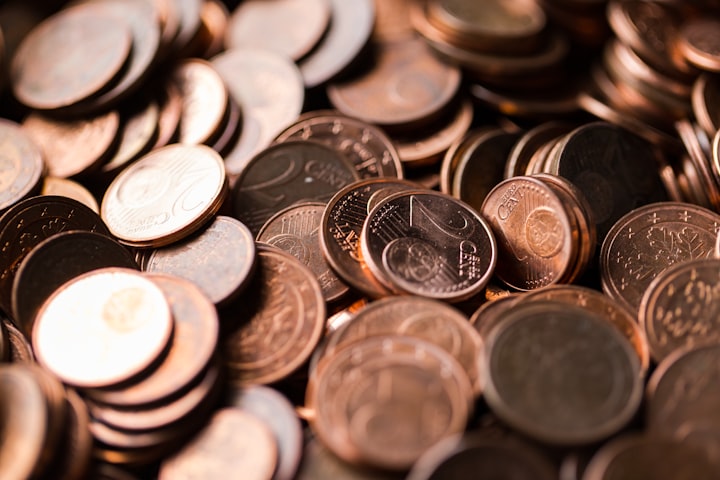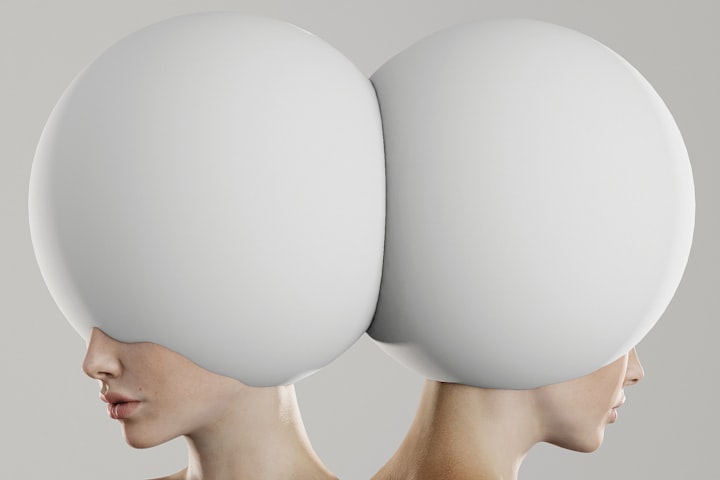
“She left everything she owned to you,” the lawyer said at the reading of Aunt Irene’s will. “Don’t expect much, though, everything in the place is ragged and old.”
I knew. I had spent countless hours with Aunt Irene over the past decade and had come to love every tattered and worn item in her little frame house.
“And I’m afraid you will have to clear everything out before the end of the month; the landlord has a new tenant waiting.” He slid her house keys across his desk and looked at me with sadness in his eyes as he said, “She told me she appreciated your visits more than you could ever know.”
I left wishing I could have at least one more of those visits. Aunt Irene had been fun, just...fun. Though not a blood relative, she and my mother had been friends since they were in their twenties. ‘Like sisters’, they always said about each other, hence the Aunt in front of Irene. Since shortly after Mother died, I had been visiting Aunt Irene every Wednesday evening and often on Saturday afternoons. I would always bring food and cook up a few days of dinners for her. I did so for myself as much as for her; she reveled in my successes, sympathized with my failures, and made me laugh.
Rattling around her house was less sad than I had anticipated. Her sense of joy still radiated from every faded photograph on her walls and ragged dress in her closet. “Task at hand,” I said aloud, repeating one of her mantras. And with a heavy-duty trash bag in one hand and a cardboard box in the other, I attacked her closets and cabinets.
A camel’s hair coat and a working Timex watch were almost the only clothing items worthy of donating to charity. I placed the patchwork quilt, of which she had been so proud, next to my purse. “I want you to have it,” she had said.
Fifteen cans of tuna were the only not-expired items in her kitchen, except for two of the dinners I had prepared earlier that week. They made me hungry. I pulled down two melamine plates from her kitchen cabinets and placed them on her tiny table, then set up place settings for two. “one more dinner with you.” I said to the memory of this lovely, happy, old friend. After I ate, I emptied the cabinets. Nothing was worth keeping.
Aunt Irene’s living room was also her office and, lying on top of her otherwise vacant desk, was a little black notebook. I slid the elastic band off the cover and opened it. Printed at the top of the first page were lines inviting information on where it should be returned if lost. Irene had written my name, along with my address and phone number and in the space suggesting what reward a finder could expect she had writted: A good time.
I chuckled, then sat down and turned the page. In the middle of it she had written:
Find a penny.
That was it, not the rest of the children’s rhyme. I turned the page, written in the center of it she had written:
What are you staring at? Go find the penny – before you do one more thing.
What the hell? I looked around the house, half expecting to feel her tugging at my sleeve. Then I glanced at the black plastic bags of stuff ready for garbage truck.
Had there been money in anything? I paused and reflected. Oddly enough, no.
My own apartment probably had twenty dollars or more, in coins and one-dollar bills, lying in various drawers and pockets or scattered across counters or desks. Not Aunt Irene’s house, tough, I recalled seeing no money, nor anything that logically would hold money.
Where is her handbag? I walked back through her bedroom and glanced around the end tables, the closet, the bathroom counters. No sign of the little tapestry handbag she had carried for as long. Then I walked into her kitchen and looked on the back of her chair, where it often hung. No.
I returned to her desk and, somewhat frantically opened drawers. Files of papers and letters and old bank statements filled all those drawers except the bottom one and there it was—the colors still vivid—a Renaissance image of a unicorn in a forest.
I sat at her chair and opened the bag. It smelled of her cologne. Inside was one Revlon lipstick, a compact of pressed powder, a linen handkerchief, and a coin purse. Folded up inside the coin purse were a ten-dollar bill, a five, and two ones. Seventeen dollars. No coins at all.
It was getting late. I had a dinner date with two old friends and a doctor’s appointment the next day. There was only one week before I had to empty the house.
With a firm grip on the desk drawer, I slid it all the way out and placed it on top of the desk. Then one handful at a time, I lifted every item out of it. A dozen pens rolled around, twice that many stamps, many more paper clips, a stapler, a magnifying glass, a few blank envelopes— bent and torn—a city map, two brittle sticks of Wrigley’s Spearmint Gum.
No pennies.
A glance at my watch caused my heart to race. Even though I was not hungry, arriving late for dinner would be rude. Five more minutes and I would have to leave.
I slid out each drawer partway and gave it a shake. No clinking of coins sound. With a sigh, I turned the pencil drawer upside down and there---taped to the bottom of the drawer--was a penny. I pulled off the tape and slipped it into my own coin purse before grabbing the little black book and bolting out the door.
All through dinner it haunted me—the question of why?
“Something on your mind?” my host asked.
His wife and I had been as close as my mother and Aunt Irene and so I told them about my afternoon. “Maybe it’s valuable, rare.” I pulled it out of the side pocket of my purse and showed it to him.
“Ah...the date is stamped or engraved with a shadow image. This penny is a mistake; nothing makes a coin more valuable than an engraving mistake.”
I watched with anticipation as he Googled the coin and learned it was worth $12,000. When he handed it back to me I almost sobbed; she could have spent this money on things that would have made her life more comfortable.
“She is playing a game with you,” he said. “Sending you on a scavenger hunt in her home. What other hints are in that book?”
The question surprised me. I had not even turned the page. I did so then, however, and on the following page she had written:
“I hope you found my little prize, dear. All games should have prizes—bacon, perhaps.”
Following that she had drawn a sideways smiley face.
:-)
“Bacon?” the wife of my host asked.
“It was a trick I played on her. She was tired, you see, in these last few weeks; she rarely did her exercises. So, I made a game of it. Aunt Irene loved bacon. Twice each week I cooked up a half-pound of bacon, then I hid it, two slices to a plate, scattered around the house.”
“She got up and hunted down that bacon.” My host said, laughing, “And now she is playing with you. Are there any other hints in that little black book?”
The next page read:
I’m going to sit right down and write myself a letter.
I was puzzled for only a moment before it hit me. “Stamps,” I said. “I saw a bunch in her desk.” I looked from his eyes to hers and then asked, “Do you really suppose there is a valuable stamp there, like in the film Charade?”
They offered their assistance with the hunt and I asked what they would want in return. “This dinner,” my host said, “And another for each treasure we discover.”
I agreed and we ordered wine—to brace us for the adventure ahead.
We rode together, my host drove, and his wife and I chatted about trying on Irene’s clothes as we played dress-up when visiting as a child. She remembered also playing Dominoes with Irene and my mother, as well as Clue, Shoots and Ladders, Monopoly, and more. She asked if she and we had still played board games.
“Trivial Pursuit,” I said, “Dominoes, of course, sometimes Yahtzee, Skip-Bo, and Scrabble.”
I sat—remembering-- a childless old woman and motherless middle-ager, playing all night long.
The loose stamps scattered around on her desk were worth no more than face value. But my host looked in each of the bent envelopes and found eight attractive, odd-looking stamps. Another internet browse revealed them to be hand-printed from Belgium. Aunt Irene and her husband had lived in Belgium—between the world wars.
“You might get more for them,” My host said, pointing to an email address. “The retail value is listed in Euros. But this collector will pay $1,000 each. I’ll his contact info to you.”
“She left you at least twenty-thousand dollars.” My friend said, looking around, “And a lot of work. Does the little black book say anything else?”
On the next page she had written:
A stitch in time
“The quilt,” I said. “What else could it be?” I picked it up and noticed a bulge beneath one of the patchwork stars, and a loose stitch. I spread it out carefully and tugged loose one of the threads just a bit, then shoved one finger into it and felt a metal clasp and a smooth bead. I worked it in between my thumb and forefinger, then tugged out a jade necklace—old, a rich medium shade of green—with what I guessed was a white gold clasp.
“So that’s at least twenty thousand dollars and a jade necklace.”
I stared down at the quilt and necklace, then remembered one more thing. I looked up at my host and his wife and said, “Plus fifteen cans of tuna.”
They looked surprised.
“I told her once that I could live on tuna.” I turned the page and read:
You are such a bright girl. I am sure you have found the penny, the stamps. and the necklace. The only remaining thing I have is gratitude for all the hours you spent with me. I could have left these treasures with my attorney for you, but I wanted to play one last game.
About the Creator
Evelyn Donahoe
A writer, career marketing professional, widow and caregiver who no longer has red hair, but still sports the attitude.






Comments
There are no comments for this story
Be the first to respond and start the conversation.